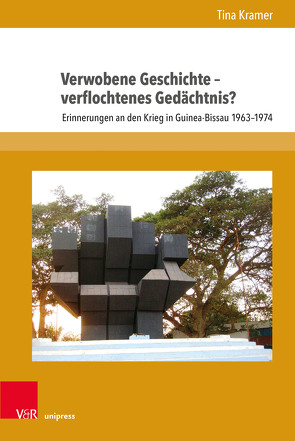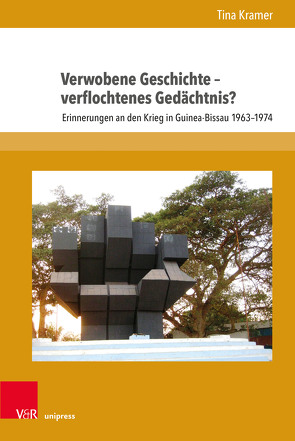
Der Krieg in Guinea-Bissau von 1963 bis 1974 war der bewaffnete Kampf der nationalen Bewegung PAIGC gegen die Vorherrschaft der portugiesischen Kolonialregierung im Land. Er sollte für die portugiesische Metropole zu einem militärisch und politisch desaströsen Krieg werden, der es im Jahre 1974 vermochte, ein ganzes Regime und mit ihm sein verbliebenes koloniales Imperium zu stürzen. Für Portugal brachte er mit der Nelkenrevolution das Ende der Diktatur, für die ehemalige portugiesische Provinz die Geburt des Staates Guinea-Bissau. Dieser tiefgreifende Aspekt ihrer Geschichte verwebt und trennt die beiden Länder historisch. Tina Kramer sucht nach den kollektiven Erinnerungen und ihren Verflechtungen zwischen Portugal und Guinea-Bissau. Dabei nimmt sie die Erinnerungspolitik beider Länder in den Blick, setzt sie in Beziehung zu den Erzählungen der Betroffenen und spürt Erinnerungsorten nach.
From 1963 to 1974 the PAIGC conducted an armed struggle against the Portuguese colonial government in Guinea Bissau. For the Portuguese metropole the war was militarily and politically disastrous, leading in 1974 to the toppling of a whole regime and what was left of its colonial empire. The Carnation Revolution brought to an end the dictatorship and led to a political reorientation towards democracy, turning what had been a Portuguese province into the state of Guinea Bissau. For both countries the war represents a far-reaching aspect of their history, which historically weaves them together and also separates them. Tina Kramer examines the collective memories it awakes in the two countries and connection in which they stand to one another. She focuses on the policies of remembrance of both countries, relates them to the narratives of those affected and locates the places of memory.
Aktualisiert: 2023-06-28
> findR *

Der Krieg in Guinea-Bissau von 1963 bis 1974 war der bewaffnete Kampf der nationalen Bewegung PAIGC gegen die Vorherrschaft der portugiesischen Kolonialregierung im Land. Er sollte für die portugiesische Metropole zu einem militärisch und politisch desaströsen Krieg werden, der es im Jahre 1974 vermochte, ein ganzes Regime und mit ihm sein verbliebenes koloniales Imperium zu stürzen. Für Portugal brachte er mit der Nelkenrevolution das Ende der Diktatur, für die ehemalige portugiesische Provinz die Geburt des Staates Guinea-Bissau. Dieser tiefgreifende Aspekt ihrer Geschichte verwebt und trennt die beiden Länder historisch. Tina Kramer sucht nach den kollektiven Erinnerungen und ihren Verflechtungen zwischen Portugal und Guinea-Bissau. Dabei nimmt sie die Erinnerungspolitik beider Länder in den Blick, setzt sie in Beziehung zu den Erzählungen der Betroffenen und spürt Erinnerungsorten nach.
From 1963 to 1974 the PAIGC conducted an armed struggle against the Portuguese colonial government in Guinea Bissau. For the Portuguese metropole the war was militarily and politically disastrous, leading in 1974 to the toppling of a whole regime and what was left of its colonial empire. The Carnation Revolution brought to an end the dictatorship and led to a political reorientation towards democracy, turning what had been a Portuguese province into the state of Guinea Bissau. For both countries the war represents a far-reaching aspect of their history, which historically weaves them together and also separates them. Tina Kramer examines the collective memories it awakes in the two countries and connection in which they stand to one another. She focuses on the policies of remembrance of both countries, relates them to the narratives of those affected and locates the places of memory.
Aktualisiert: 2023-06-28
> findR *

Der Krieg in Guinea-Bissau von 1963 bis 1974 war der bewaffnete Kampf der nationalen Bewegung PAIGC gegen die Vorherrschaft der portugiesischen Kolonialregierung im Land. Er sollte für die portugiesische Metropole zu einem militärisch und politisch desaströsen Krieg werden, der es im Jahre 1974 vermochte, ein ganzes Regime und mit ihm sein verbliebenes koloniales Imperium zu stürzen. Für Portugal brachte er mit der Nelkenrevolution das Ende der Diktatur, für die ehemalige portugiesische Provinz die Geburt des Staates Guinea-Bissau. Dieser tiefgreifende Aspekt ihrer Geschichte verwebt und trennt die beiden Länder historisch. Tina Kramer sucht nach den kollektiven Erinnerungen und ihren Verflechtungen zwischen Portugal und Guinea-Bissau. Dabei nimmt sie die Erinnerungspolitik beider Länder in den Blick, setzt sie in Beziehung zu den Erzählungen der Betroffenen und spürt Erinnerungsorten nach.
From 1963 to 1974 the PAIGC conducted an armed struggle against the Portuguese colonial government in Guinea Bissau. For the Portuguese metropole the war was militarily and politically disastrous, leading in 1974 to the toppling of a whole regime and what was left of its colonial empire. The Carnation Revolution brought to an end the dictatorship and led to a political reorientation towards democracy, turning what had been a Portuguese province into the state of Guinea Bissau. For both countries the war represents a far-reaching aspect of their history, which historically weaves them together and also separates them. Tina Kramer examines the collective memories it awakes in the two countries and connection in which they stand to one another. She focuses on the policies of remembrance of both countries, relates them to the narratives of those affected and locates the places of memory.
Aktualisiert: 2023-06-28
> findR *

Der Krieg in Guinea-Bissau von 1963 bis 1974 war der bewaffnete Kampf der nationalen Bewegung PAIGC gegen die Vorherrschaft der portugiesischen Kolonialregierung im Land. Er sollte für die portugiesische Metropole zu einem militärisch und politisch desaströsen Krieg werden, der es im Jahre 1974 vermochte, ein ganzes Regime und mit ihm sein verbliebenes koloniales Imperium zu stürzen. Für Portugal brachte er mit der Nelkenrevolution das Ende der Diktatur, für die ehemalige portugiesische Provinz die Geburt des Staates Guinea-Bissau. Dieser tiefgreifende Aspekt ihrer Geschichte verwebt und trennt die beiden Länder historisch. Tina Kramer sucht nach den kollektiven Erinnerungen und ihren Verflechtungen zwischen Portugal und Guinea-Bissau. Dabei nimmt sie die Erinnerungspolitik beider Länder in den Blick, setzt sie in Beziehung zu den Erzählungen der Betroffenen und spürt Erinnerungsorten nach.
From 1963 to 1974 the PAIGC conducted an armed struggle against the Portuguese colonial government in Guinea Bissau. For the Portuguese metropole the war was militarily and politically disastrous, leading in 1974 to the toppling of a whole regime and what was left of its colonial empire. The Carnation Revolution brought to an end the dictatorship and led to a political reorientation towards democracy, turning what had been a Portuguese province into the state of Guinea Bissau. For both countries the war represents a far-reaching aspect of their history, which historically weaves them together and also separates them. Tina Kramer examines the collective memories it awakes in the two countries and connection in which they stand to one another. She focuses on the policies of remembrance of both countries, relates them to the narratives of those affected and locates the places of memory.
Aktualisiert: 2023-06-28
> findR *

Der Krieg in Guinea-Bissau von 1963 bis 1974 war der bewaffnete Kampf der nationalen Bewegung PAIGC gegen die Vorherrschaft der portugiesischen Kolonialregierung im Land. Er sollte für die portugiesische Metropole zu einem militärisch und politisch desaströsen Krieg werden, der es im Jahre 1974 vermochte, ein ganzes Regime und mit ihm sein verbliebenes koloniales Imperium zu stürzen. Für Portugal brachte er mit der Nelkenrevolution das Ende der Diktatur, für die ehemalige portugiesische Provinz die Geburt des Staates Guinea-Bissau. Dieser tiefgreifende Aspekt ihrer Geschichte verwebt und trennt die beiden Länder historisch. Tina Kramer sucht nach den kollektiven Erinnerungen und ihren Verflechtungen zwischen Portugal und Guinea-Bissau. Dabei nimmt sie die Erinnerungspolitik beider Länder in den Blick, setzt sie in Beziehung zu den Erzählungen der Betroffenen und spürt Erinnerungsorten nach.
From 1963 to 1974 the PAIGC conducted an armed struggle against the Portuguese colonial government in Guinea Bissau. For the Portuguese metropole the war was militarily and politically disastrous, leading in 1974 to the toppling of a whole regime and what was left of its colonial empire. The Carnation Revolution brought to an end the dictatorship and led to a political reorientation towards democracy, turning what had been a Portuguese province into the state of Guinea Bissau. For both countries the war represents a far-reaching aspect of their history, which historically weaves them together and also separates them. Tina Kramer examines the collective memories it awakes in the two countries and connection in which they stand to one another. She focuses on the policies of remembrance of both countries, relates them to the narratives of those affected and locates the places of memory.
Aktualisiert: 2023-05-28
> findR *

Der Krieg in Guinea-Bissau von 1963 bis 1974 war der bewaffnete Kampf der nationalen Bewegung PAIGC gegen die Vorherrschaft der portugiesischen Kolonialregierung im Land. Er sollte für die portugiesische Metropole zu einem militärisch und politisch desaströsen Krieg werden, der es im Jahre 1974 vermochte, ein ganzes Regime und mit ihm sein verbliebenes koloniales Imperium zu stürzen. Für Portugal brachte er mit der Nelkenrevolution das Ende der Diktatur, für die ehemalige portugiesische Provinz die Geburt des Staates Guinea-Bissau. Dieser tiefgreifende Aspekt ihrer Geschichte verwebt und trennt die beiden Länder historisch. Tina Kramer sucht nach den kollektiven Erinnerungen und ihren Verflechtungen zwischen Portugal und Guinea-Bissau. Dabei nimmt sie die Erinnerungspolitik beider Länder in den Blick, setzt sie in Beziehung zu den Erzählungen der Betroffenen und spürt Erinnerungsorten nach.
From 1963 to 1974 the PAIGC conducted an armed struggle against the Portuguese colonial government in Guinea Bissau. For the Portuguese metropole the war was militarily and politically disastrous, leading in 1974 to the toppling of a whole regime and what was left of its colonial empire. The Carnation Revolution brought to an end the dictatorship and led to a political reorientation towards democracy, turning what had been a Portuguese province into the state of Guinea Bissau. For both countries the war represents a far-reaching aspect of their history, which historically weaves them together and also separates them. Tina Kramer examines the collective memories it awakes in the two countries and connection in which they stand to one another. She focuses on the policies of remembrance of both countries, relates them to the narratives of those affected and locates the places of memory.
Aktualisiert: 2023-04-28
> findR *
MEHR ANZEIGEN
Bücher zum Thema Kolonialgeschichte Portugals
Sie suchen ein Buch über Kolonialgeschichte Portugals? Bei Buch findr finden Sie eine große Auswahl Bücher zum
Thema Kolonialgeschichte Portugals. Entdecken Sie neue Bücher oder Klassiker für Sie selbst oder zum Verschenken. Buch findr
hat zahlreiche Bücher zum Thema Kolonialgeschichte Portugals im Sortiment. Nehmen Sie sich Zeit zum Stöbern und finden Sie das
passende Buch für Ihr Lesevergnügen. Stöbern Sie durch unser Angebot und finden Sie aus unserer großen Auswahl das
Buch, das Ihnen zusagt. Bei Buch findr finden Sie Romane, Ratgeber, wissenschaftliche und populärwissenschaftliche
Bücher uvm. Bestellen Sie Ihr Buch zum Thema Kolonialgeschichte Portugals einfach online und lassen Sie es sich bequem nach
Hause schicken. Wir wünschen Ihnen schöne und entspannte Lesemomente mit Ihrem Buch.
Kolonialgeschichte Portugals - Große Auswahl Bücher bei Buch findr
Bei uns finden Sie Bücher beliebter Autoren, Neuerscheinungen, Bestseller genauso wie alte Schätze. Bücher zum
Thema Kolonialgeschichte Portugals, die Ihre Fantasie anregen und Bücher, die Sie weiterbilden und Ihnen wissenschaftliche
Fakten vermitteln. Ganz nach Ihrem Geschmack ist das passende Buch für Sie dabei. Finden Sie eine große Auswahl
Bücher verschiedenster Genres, Verlage, Autoren bei Buchfindr:
Sie haben viele Möglichkeiten bei Buch findr die passenden Bücher für Ihr Lesevergnügen zu entdecken. Nutzen Sie
unsere Suchfunktionen, um zu stöbern und für Sie interessante Bücher in den unterschiedlichen Genres und Kategorien
zu finden. Unter Kolonialgeschichte Portugals und weitere Themen und Kategorien finden Sie schnell und einfach eine Auflistung
thematisch passender Bücher. Probieren Sie es aus, legen Sie jetzt los! Ihrem Lesevergnügen steht nichts im Wege.
Nutzen Sie die Vorteile Ihre Bücher online zu kaufen und bekommen Sie die bestellten Bücher schnell und bequem
zugestellt. Nehmen Sie sich die Zeit, online die Bücher Ihrer Wahl anzulesen, Buchempfehlungen und Rezensionen zu
studieren, Informationen zu Autoren zu lesen. Viel Spaß beim Lesen wünscht Ihnen das Team von Buchfindr.





